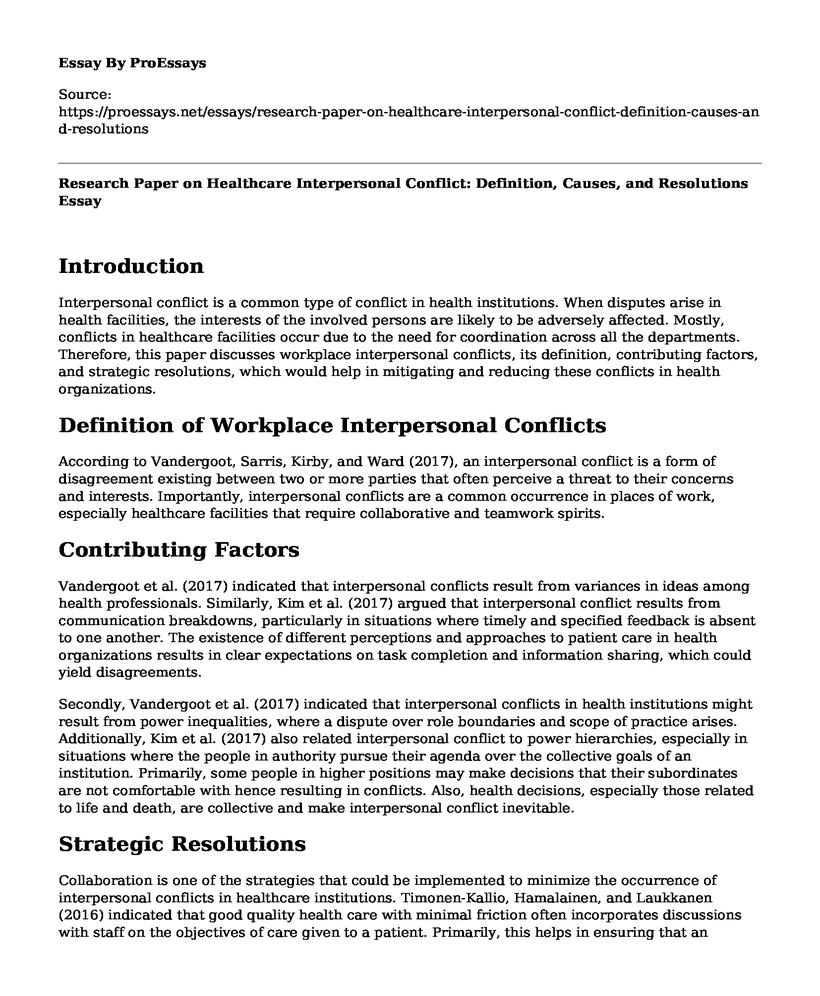Introduction
Interpersonal conflict is a common type of conflict in health institutions. When disputes arise in health facilities, the interests of the involved persons are likely to be adversely affected. Mostly, conflicts in healthcare facilities occur due to the need for coordination across all the departments. Therefore, this paper discusses workplace interpersonal conflicts, its definition, contributing factors, and strategic resolutions, which would help in mitigating and reducing these conflicts in health organizations.
Definition of Workplace Interpersonal Conflicts
According to Vandergoot, Sarris, Kirby, and Ward (2017), an interpersonal conflict is a form of disagreement existing between two or more parties that often perceive a threat to their concerns and interests. Importantly, interpersonal conflicts are a common occurrence in places of work, especially healthcare facilities that require collaborative and teamwork spirits.
Contributing Factors
Vandergoot et al. (2017) indicated that interpersonal conflicts result from variances in ideas among health professionals. Similarly, Kim et al. (2017) argued that interpersonal conflict results from communication breakdowns, particularly in situations where timely and specified feedback is absent to one another. The existence of different perceptions and approaches to patient care in health organizations results in clear expectations on task completion and information sharing, which could yield disagreements.
Secondly, Vandergoot et al. (2017) indicated that interpersonal conflicts in health institutions might result from power inequalities, where a dispute over role boundaries and scope of practice arises. Additionally, Kim et al. (2017) also related interpersonal conflict to power hierarchies, especially in situations where the people in authority pursue their agenda over the collective goals of an institution. Primarily, some people in higher positions may make decisions that their subordinates are not comfortable with hence resulting in conflicts. Also, health decisions, especially those related to life and death, are collective and make interpersonal conflict inevitable.
Strategic Resolutions
Collaboration is one of the strategies that could be implemented to minimize the occurrence of interpersonal conflicts in healthcare institutions. Timonen-Kallio, Hamalainen, and Laukkanen (2016) indicated that good quality health care with minimal friction often incorporates discussions with staff on the objectives of care given to a patient. Primarily, this helps in ensuring that an agreement is achieved between the conflicting parties. Hence, this reduces and minimizes the effects of conflicts in organizations. Consequently, Park et al. (2014) reiterated the need for collaborative practices in healthcare. The author indicates that collaboration is an essential component since it aids in fostering synchronized and thorough care services for the clients in the society.
Vandergoot et al. (2017) further stipulated that conflict resolution skills could be instigated to professionals when still in school. Mainly, this means that education is one of the resources for conflict resolution. Vandergoot et al. (2017) indicated that students with the highest motivation and positive attitude towards inter-professional learning tend to have and implemented conflict resolution skills in their careers. From this, one can see the need to educate learners on inter-professional collaboration and equip them with skills that would help them to manage and mitigate conflicts in the workplaces in future. Lastly, clarification of professional goals and roles would be another factor that would help in reducing conflicts resulting from power disputes and hierarchies (Kim et al., 2017). Health institutions ought to ensure that all the staffs are aware of their roles and professional contributions.
Reflection on Learning
Importantly, this project was informative. I have learned about workplace interpersonal conflicts and their consequences in health institutions. The knowledge gained from this research will be applied in my future career in a variety of ways. First, I will always advocate for inter-professional collaboration in workplaces that would help minimize and reduce the extent of conflicts. Second, I will familiarize myself with the conflict resolution skills that would help in managing conflicts in workplaces. Mainly, this will help to ensure that I deal with any form of disputes without any significant challenges. Lastly, I will work closely with my colleagues in my nursing career, particularly in situations that require intensive decision making. The move would minimize any interpersonal conflicts likely to arise.
Conclusion
In summation, this paper discusses workplace interpersonal conflicts. Importantly, interpersonal conflicts often arise due to a variety of reasons such as lack of collaboration, differing ideas and perspectives on healthcare, and power inequalities. The consequences of these conflicts include work stresses and inadequate work satisfaction, which shows the importance of this study.
References
Kim, S., Bochatay, N., Relyea-Chew, A., Buttrick, E., Amdahl, C., & Kim, L. et al. (2017). Individual, interpersonal, and organisational factors of healthcare conflict: a scoping review. Journal of Interprofessional Care, 31(3), 282-290. doi: 10.1080/13561820.2016.1272558
Park, J., Hawkins, M., Hamlin, E., Hawkins, W., & Bamdas, J. (2014). Developing positive attitudes toward inter-professional collaboration among students in the health care professions. Educational Gerontology, 40(12), 894-908. doi: 10.1080/03601277.2014.908619
Timonen-Kallio, E., Hamalainen, J., & Laukkanen, E. (2016). Inter-professional collaboration in Finnish residential child care: challenges in incorporating and sharing expertise between the child protection and health care systems. Child Care in Practice, 23(4), 389-403. doi: 10.1080/13575279.2016.1158153
Vandergoot, S., Sarris, A., Kirby, N., & Ward, H. (2017). Exploring undergraduate students' attitudes towards interprofessional learning, motivation-to-learn, and perceived impact of learning conflict resolution skills. Journal of Interprofessional Care, 32(2), 211-219. doi: 10.1080/13561820.2017.1383975
Cite this page
Research Paper on Healthcare Interpersonal Conflict: Definition, Causes, and Resolutions. (2023, Feb 17). Retrieved from https://proessays.net/essays/research-paper-on-healthcare-interpersonal-conflict-definition-causes-and-resolutions
If you are the original author of this essay and no longer wish to have it published on the ProEssays website, please click below to request its removal:
- Medical Research and Ethical Dilemmas Essay
- Issues Recommended Action With Supporting Rationale - Essay Sample
- HIPAA Privacy Rule: Standards for Protecting Patients' Data - Essay Sample
- The Severity of Emissions From Vaping Vs. Smoking: A Comparative Study - Essay Sample
- Essay Example on Flu Symptoms: Respiratory & Constitutional
- Paper Example on Code Naming: Strategic Role in Condition Diagnosis & Interventions
- Lead Analyst's Challenge: Persuading Stakeholders With Data - Free Report Example







